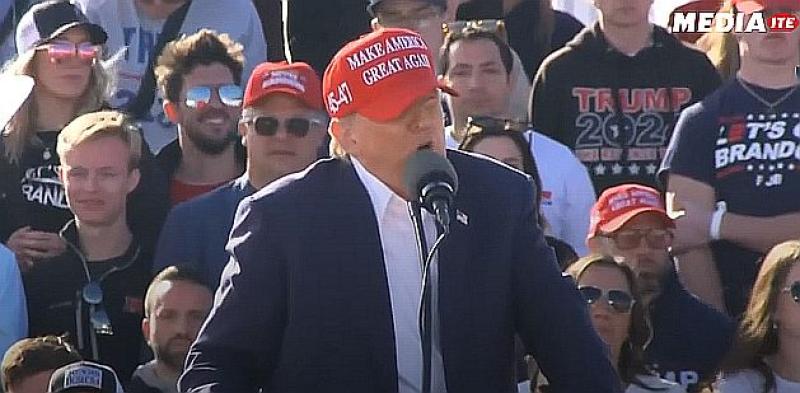'Bloodbath' Aside, Trump's Violent Rhetoric Is Unambiguous


- Trump in 2016 said that if he were denied the presidential nomination at the GOP convention, “ I think you’d have riots .”
- Trump in November 2020 responded to an adverse ruling by the Pennsylvania Supreme Court by saying it would “ induce violence in the streets .” (Trump later expanded, saying, “Bad things will happen, and bad things lead to other type things . It’s a very dangerous thing for our country.”)
- Trump warned last March of “ potential death & destruction ” if he were charged by the Manhattan district attorney. He also mocked those who urged his supporters to stay peaceful, saying, “OUR COUNTRY IS BEING DESTROYED, AS THEY TELL US TO BE PEACEFUL! ”
- Trump warned in August, after the search of his Mar-a-Lago estate, that “ terrible things are going to happen .” He later promoted a comment from Sen. Lindsey Graham (R-S.C.) that there would be “ riots in the streets ” if Trump were charged.
- Trump in January warned of “ bedlam in the country ” if the criminal charges against him succeeded. Days earlier, he targeted efforts to remove him from the ballot using the 14th Amendment, saying: “Because if we don’t [get treated fairly], our country’s in big, big trouble. Does everybody understand what I’m saying? I think so. ”

In an interview with Donald Trump that aired over the weekend, Fox News host Howard Kurtz presented Trump with a not-exactly-novel theory: that Trump uses “over the top, sometimes inflammatory language” to draw attention.
Trump conceded that “if you don’t use certain words, that maybe are not very nice words, nothing will happen.”
The weekend provided ample evidence of that dynamic, particularly when Trump invited yet another tempest with his violent rhetoric. This time, he warned of a “bloodbath” if he loses in November. Trump’s allies claim he’s being taken out of context and unfairly attacked.
To recap: Appearing at a rally in Ohio, Trump riffed on his proposal for a 100 percent tariff on Chinese-made cars to protect the U.S. auto industry.
“Now, if I don’t get elected,” he continued, “it’s going to be a bloodbath for the whole — that’s going to be the least of it. It’s going to be a bloodbath for the country.”
Here’s what we can say: Trump might indeed have been speaking metaphorically in this case. But the broader context here is vital. And that context is that Trump has repeatedly invoked the prospect of actual violence by his supporters while speaking about similar circumstances — his losing or facing criminal accountability, for example. We also saw a pronounced example of his supporters seizing on his rhetoric when they stormed the Capitol on Jan. 6 , 2021.
Which makes it much more difficult to dismiss the “bloodbath” comment as overheated rhetoric. Trump is, at the very least, deliberately playing with fire. And this is merely the most recent example.
Trump backers and even some conservative Trump critics dismissed the comment as, more or less, standard-issue political rhetoric. Some suggested that Trump was merely talking about a “bloodbath” for the auto industry (even though he was clearly saying the “bloodbath” would extend beyond that industry).
Regardless, a focus on the one word misses the point. It’s not that this isolated comment is particularly egregious; it’s that it is merely the latest example of this kind of rhetoric. And the rhetoric is often more direct:
And this doesn’t even account for the many, many examples of his alluding more suggestively to righteous violence by his supporters . He does this a lot. Sometimes it’s direct; sometimes it’s veiled and carries with it the plausible deniability that he craves.
But is it really ridiculous to suggest that the guy who warned of “riots,” “violence in the streets” and “death & destruction” if he were wronged might be gesturing in that direction again? Of course not.
More than that, history gives weight to comments like these. And that history includes Trump’s supporters turning violent after the 2020 election — and after they appeared to interpret his comments as encouragement.
At a 2020 presidential debate, Trump was asked to repudiate violence by white supremacists and the Proud Boys, a far-right group. Trump responded by telling the Proud Boys not to “stand down,” as had been suggested, but to “stand back and stand by.” That set off a fuss similar to the one we see today, with Trump allies and media critics asserting that this was much ado about nothing — just some awkward phrasing! For days, Trump and his White House resisted calls to clarify.
Months later, the Proud Boys — who in real time appeared to interpret Trump’s comments as a call to action — played a central role in the Capitol insurrection.
Also interpreting Trump’s various comments as a call to action, according to their legal defenses: many other Jan. 6 defendants .
With that kind of history, it’s certainly a choice for Trump to keep talking like this. And there was even a time when Republicans worried about what Trump might be fomenting.
Sen. Ted Cruz (R-Tex.) said explicitly in April 2016 that Trump, even at that point, had “ a consistent pattern of inciting violence .”
Sen. Marco Rubio (R-Fla.), in dropping out of the race, directly linked Trump’s rhetoric to violent clashes in Chicago after a Trump rally was postponed.
“The broader anger that now exists in the American political discourse is a direct result of the fact that words have consequences,” Rubio said . “That when you run for President of the United States or if you are President of the United States … you can’t just take on the attitude that I’m going to say whatever I want.”
Rubio added: “You can’t say whatever you want. It has real-life consequences for people in this country, and all over the world. And we’re starting to see it bear out.”
Rubio’s warning, in particular, is applicable to what we see today. Trump has shown no sign of moderating his rhetoric despite the example of Jan. 6. Whether he’s doing it to merely provoke, because he wants to warn his critics, or because he actually wants his supporters to be ready to rise up, that doesn’t change the fact that it can be dangerous — in a way that Trump, those around him and even his many defenders must know.
You can argue that one comment is being blown out of proportion. But the track record here is clear.




[✘]
Can you possibly make a comment that has something to do with the article
[✘]
Trump will grow increasingly shrill as the election season matures. Especially if he continues to be cash strapped and is actually tried (if ever) for his wrongdoing as PotUS.
He will behave like a cornered animal and his defense will be the anger of his supporters. He will stoke that anger at every turn with incendiary rhetoric.
His reputation of unfiltered rhetorical exaggeration is well known and is rejected by most knowledgeable and normal people.
Here again, context is everything.
And then what about the more irrational, emotional, naive people? Like those who hang on his every word and engage in acts of violence in response? See: the Capitol insurrection.
That is what I was talking about Greg.
Further, do you think it is good to have a PotUS who engages in "unfiltered rhetorical exaggeration"?
Oh my Lord. These idiots need to move on. They royally fucked up on “bloodbath” but they keep trying to redeem it.
He didn’t invite anything. Neither was it “ample evidence” of anything. What he said was ordinary rhetoric, not “violent rhetoric.” In fact, it’s so ordinary, that the Merriam-Webster Dictionary defines it exactly in the way that he used it.
This is where the anti-Trump media and politicians go too far. They take something Trump did or said - something common and benign - and try to turn it into a horrifying scandal. But in the process, they reveal themselves to be opportunistic liars and create sympathy for Trump. Talk about “shooting yourself in the foot.”
As seen in this article trump has repeatedly used language related to violence in his speeches. Consequently he doesn't get the benefit of the doubt other people without his history might.
The seeded article is not really about the "bloodbath" comment, its about all these other comments that leave him open to these sort of criticisms.
I agree that it shouldn’t be about that, but it’s in the title, and the author goes back to it multiple times and tries to justify concern over it. That’s why I said they keep trying to redeem it.
I think it’s fine to catalog the genuinely problematic shit that Trump says, but it needs to be true, and unambiguous. Spring-boarding off mistakes like the “bloodbath” non-scandal just doubles down on the disingenuous attack, and helps Trump.